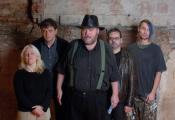 Pere Ubu emerged from the urban wastelands of mid-'70s Cleveland to impact the American underground for generations to follow; led by hulking frontman David Thomas, whose absurdist warble and rapturously demented lyrics remained the band's creative focus throughout their long, convoluted career, Ubu's protean art-punk sound harnessed self-destructing melodies, scattershot rhythms, and industrial-strength dissonance to capture the angst and chaos of their times with both apocalyptic fervor and surprising humanity. Named in honor of Alfred Jarry's surrealist play Ubu Roi, Pere Ubu was formed in the autumn of 1975 from the ashes of local cult favorite Rocket From the Tombs, reuniting Thomas (aka Crocus Behemoth) with guitarist Peter Laughner; adding guitarist Tom Herman, bassist Tim Wright, keyboardist Allen Ravenstine, and drummer Scott Krauss, the group soon issued its debut single, "30 Seconds Over Tokyo," on Thomas' Hearthan label. The follow-up, "Final Solution," appeared on the renamed Hearpen in early 1976, and resulted in a series of live dates at the famed New York City club Max's Kansas City.
Pere Ubu emerged from the urban wastelands of mid-'70s Cleveland to impact the American underground for generations to follow; led by hulking frontman David Thomas, whose absurdist warble and rapturously demented lyrics remained the band's creative focus throughout their long, convoluted career, Ubu's protean art-punk sound harnessed self-destructing melodies, scattershot rhythms, and industrial-strength dissonance to capture the angst and chaos of their times with both apocalyptic fervor and surprising humanity. Named in honor of Alfred Jarry's surrealist play Ubu Roi, Pere Ubu was formed in the autumn of 1975 from the ashes of local cult favorite Rocket From the Tombs, reuniting Thomas (aka Crocus Behemoth) with guitarist Peter Laughner; adding guitarist Tom Herman, bassist Tim Wright, keyboardist Allen Ravenstine, and drummer Scott Krauss, the group soon issued its debut single, "30 Seconds Over Tokyo," on Thomas' Hearthan label. The follow-up, "Final Solution," appeared on the renamed Hearpen in early 1976, and resulted in a series of live dates at the famed New York City club Max's Kansas City.
Laughner's longstanding battles with drugs and alcohol forced his exit from Pere Ubu in June of 1976; within a year, he was dead. The group continued on as a quintet, with bassist Tony Maimone signing on in the wake of Wright's move to New York, where he joined the pioneering no wave band DNA. In the wake of their third single, "Street Waves," Thomas was approached by Mercury label A&R exec Cliff Burnstein, who convinced the label to form a new imprint, Blank Records, for the express purposes of signing Pere Ubu; their debut LP, The Modern Dance, was issued in early 1978, and although the record made little commercial impact at home or abroad, its manic intensity and dark impenetrability proved profoundly influential on countless post-punk acts on both sides of the Atlantic. The follow-up, Dub Housing, was even better, pushing the band to further extremes of otherworldliness, but already the cracks were beginning to show, and upon completing 1979's New Picnic Time (working title: "Goodbye"), Ubu disbanded. Although the group re-formed months later, Herman opted not to return, and was replaced by Red Krayola mastermind Mayo Thompson.
The Art of Walking followed in 1980, with subsequent tours in support of the record heralding the increasingly pop-centric sound which would distinguish later Ubu projects; a live record, 390 Degrees of Simulated Stereo, appeared a year later. Krauss was replaced by drummer Anton Fier for 1982's Song of the Bailing Man, but as before personal and creative differences began taking their toll and Ubu again disbanded; while Maimone and Krauss reunited in the group Home and Garden, Thomas continued the solo career he'd begun with the 1981 effort The Sound of the Sand (And Other Songs of the Pedestrians), a collaboration with guitar virtuoso Richard Thompson. He recorded 1987's Blame the Messenger with the Wooden Birds, a backing band including fellow Ubu alums Ravenstine and Maimone; after Krauss sat in for a Cleveland live date, the decision was made to begin working as Pere Ubu again. Guitarist Jim Jones and drummer Chris Cutler were also recruited for 1988's comeback effort The Tenement Year, a vividly idiosyncratic pop album far more accessible than anything in the band's back catalog.
1989's Stephen Hague-produced Cloudland further refined the approach, with the video for the single "Waiting for Mary" even earning limited MTV airplay; after both Ravenstine and Cutler exited Pere Ubu (the former becoming a commercial airline pilot), one-time Captain Beefheart sideman Eric Drew Feldman was installed for 1991's Worlds in Collision. Feldman soon departed as well to join Frank Black, and the remaining quartet recorded 1993's Story of My Life for the short-lived Imago label; Maimone was the next to go, with bassist Michele Temple and keyboardist Garo Yellin stepping in for 1995's planned swan song, Ray Gun Suitcase. As Ubu again slipped into limbo, the band's massive influence was celebrated in 1996 with the release of the five-disc box set Datapanik in the Year Zero; the renewed interest spurred Thomas back into action, and he reunited with Tom Herman for the first time in two decades to record 1998's sprawling Pennsylvania (also featuring holdovers Jones and Temple in addition to keyboardist Robert Wheeler and drummer Steve Mehlman). Four years later, Pere Ubu captured their darkest and most theatrical work to date with St. Arkansas. ~ Jason Ankeny, All Music Guide
Written by Jason Ankeny
http://music.yahoo.com/ar-260495-bio--...